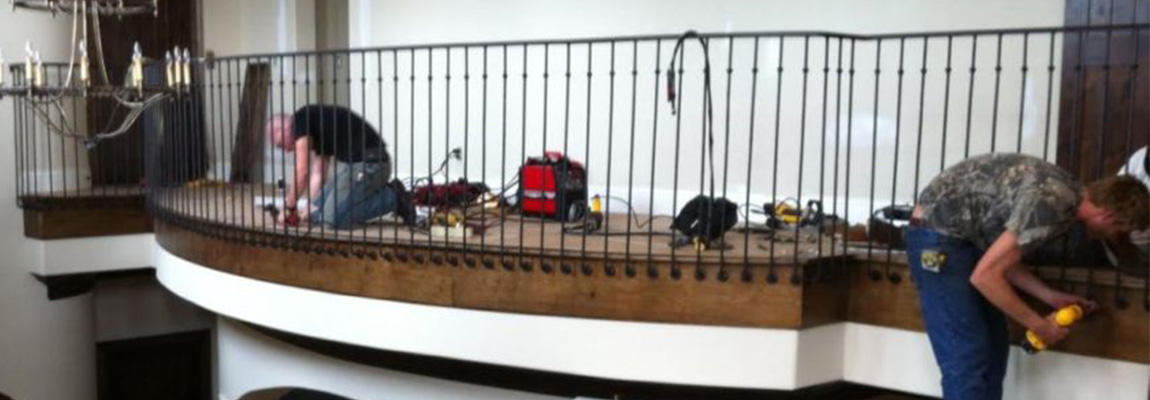
Slade Richardson – Iron Man of the Beaches
By: Ron P. Whittington
For Shorelines
For more than 20 years, Slade Richardson and his team at Classic Iron Décor, Inc. on Ninth Street at Tenth Avenue South in Jacksonville Beach have been creating and installing interior railings, gates and even fabricating iron furniture for thousands of homeowners living along the beaches from Fernandina Beach down to St. Augustine.
While there are certainly some elements of art in the architectural design of a home, Richardson says there is a special artistry that makes his business unique within all the facets of residential construction – and their work has been growing in demand recently as new houses are becoming “more and more custom” rather than cookie-cutter in design.
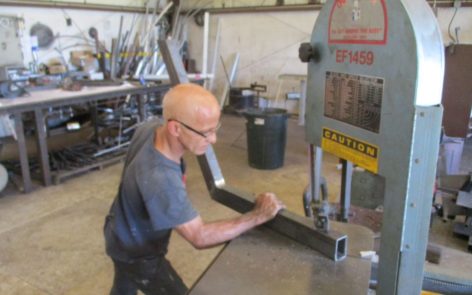
Jose Rodriguez, a fabricator with Classic Iron Décor, Inc. in Jacksonville Beach, works on the pieces of an iron table being created for a customer. Owner Slade Richardson says that based on the customer’s vision for the piece, he drew up the design on a computer and provided it to Rodriguez – who essentially puts it all together.
“When I first got into the business, there were just a few iron balusters that were really popular that went into nearly every single home that called for them,” Richardson said. “These days, people are a little more forward-thinking, more artsy, more decorative in thought and much bolder in their choices, and that’s something I really like because it allows us just to do a lot of different things in and around the home.”
He said the introduction of water-jetting, which involves taking high-pressure water and cutting and making designs into the steel and iron, has given his team many more options when it comes to designs. A water jet cutter, also known as a water jet or waterjet, is an industrial tool capable of cutting a wide variety of materials using a very high-pressure jet of water, or a mixture of water along with an abrasive material.
“The water is forced through a hole about the size of a ballpoint pen, which puts out a stream of about 50,000 to 75,000 pounds per square inch, and we’ve gotten into more use of water-jetting over the last seven years or so,” he said.
When Richardson got into the iron business two decades ago, he admits he knew nothing about the industry. Richardson grew up in Arlington, went to Terry Parker High School and then went to Florida State University where he joined the ROTC and later served as an officer in the U.S. Army. After nine years in the service, during which time he was deployed to Somalia during Desert Storm, he decided “it was time to come home.” At the time, Richardson was interviewing with pharmaceutical companies, but says he felt like that that transition was like “leaving one army to join another army in corporate America.”
"It didn’t really excite me,” he said. “But then my father-in-law gave me the opportunity to start an iron business. The guy who owned it didn’t want to manage it, so this presented itself and I jumped at it, but I knew nothing about the business at the time. I ended up getting out of the army on a Friday in May of 1994 and started this business the next Monday.”
Starting in a brand new business, Richardson said he initially took any jobs he could find.
“When we first started out I very much used a ‘shot-gun approach’ and did everything…whether it was a commercial or a residential project, it didn’t matter,” he said. “Then, over time I began fine-tuning our work to focus on what I liked to do and what we were very good at, so we landed working primarily in residential iron works – creating and installing interior railings and staircases, exterior gates, ornamental gates around the pool and that sort of thing.”
He credits the help of some key people early on, and his long-time foreman Jon Medley who has worked with him for 20 years, for making the business a success.
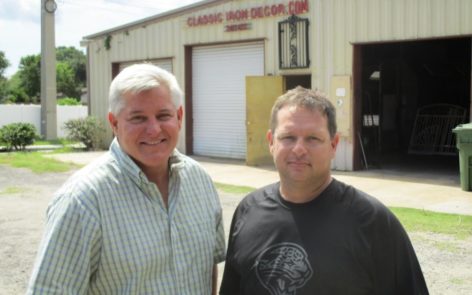
Slade Richardson (left), owner of Classic Iron Décor, Inc. in Jacksonville Beach, credits several people with helping him build a successful business – including his long-time foreman Jon Medley who has worked with him for 20 years. “Jon’s my right-hand man and he and I work very well together,” Richardson said. “My success largely has been because of Jon. Like anything, if you surround with good people and some people who can teach you, you can be successful at nearly anything.”
“Jon’s my right-hand man and he and I work very well together,” Richardson said. “He handles the more technical stuff, whereas I concentrate on the design and working with the customer. My success largely has been because of Jon. Like anything, if you surround with good people and some people who can teach you, you can be successful at nearly anything.”
Richardson also said that John Bohn, now the vice president of sales with Chauncey Metals, was also instrumental in getting his business off the ground in the early days.
“That’s one of the nice things about this industry, really throughout Jacksonville, you can pick up the phone and call someone and say ‘I need some help,’ and you’ll get it,” Richardson said. “The second day I was in business, I walked into the office of Chauncey Metals and talked to John and said ‘this is who I am, this is what I’m trying to do, so if there are any projects you don’t want to do, send them my way.’ John and his company have continued to do that for more than 20 years now.”
Bohn, who has been with Chauncey Metals since 1989, says his company now works solely in providing structural steel and metal works for multi-family apartment complexes throughout the Southeast U.S., but at one time did work with residential home builders.
“These are projects we just don’t do anymore, so we send those jobs to Slade all the time,” Bohn said. “When people call us for interior iron and metal work for their homes, we try to lead them in the right direction.”
Richardson notes that the metal industry “is very niche-y.”
“I tell people to think of the industry as a big playground, and in my sandbox I work with ornamental iron, decorative and artisan-type stuff, while John’s business was building apartment complexes.”
Richardson’s business was humming along and growing, with his staff numbering 17, until the 2008 real estate crash.
“It gutted me, as it gutted everybody related to real estate, especially in residential,” he said. “I went from about 15-week backlog to calling people and saying ‘hey, can we do the project this afternoon?’”
Richardson said one mistake he made at the time was trying to take care of his employees at the expense of the company’s viability.
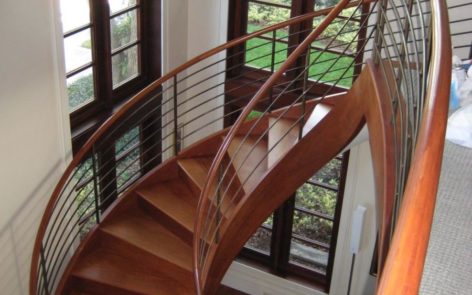
Spiral Staircase
“I tried to keep my payroll elevated and I did it in trying to take care of my people, but there’s a thin line between making a business mistake and taking care of your employees,” he said. “In the end, when I had to cut those paychecks and let people go, and I was still the bad guy. I learned a valuable lesson: go ahead and cut your losses early, because you and the business need to survive. We’re in business to make money and if you’re not making money, you can’t take care of anyone, including yourself.”
Richardson’s staff eventually shrunk down to three people, including himself, until the economy began to recover. There are now 10 employees with the company – and business is steady.
While he focuses on projects in the beaches area, he says the company will do projects anywhere if it makes sense for the business.
“Over the years, and today, typically it’s the contractor who hires us,” he said. “They usually come in and say ‘here’s what we want to do.’ But now days, because the homes are getting to be extremely custom, the customers are more forward-thinking.”
Richardson says he either meets with the building contractor or homeowner and, either through the company’s website or by looking at previous project photos at their office, he figures out what they like and what they don’t like, and then determines how to design the project.
“For example, with a staircase, we ask ‘do you have a vision for your rail?’” he said. “If I can just get that vision, I can take that and massage it enough to kind of fill out the empty blanks. They can look at my website, or even bring photos from magazines. I say ‘don’t bring in 50 pictures, bring me four: what you love, one you don’t like and a couple in between,’ and from there we can create something. Between photos, drawings or just talking to them, I can pull out what they want.”
The number of projects the company does varies from year to year because of their various sizes, but Richardson said the trend is toward larger residential projects because home sizes are increasing.
“But we still do front porch rails and the basic projects, the bread and butter projects, too,” he said.
Most of the work the company does takes place at the facility on Ninth Street.
“In the old days, I’d order spiral staircases and bring them here and assemble them,” he said. “Now, I can build a kit here, full blown, and have four guys go out to the job site to put it in.”
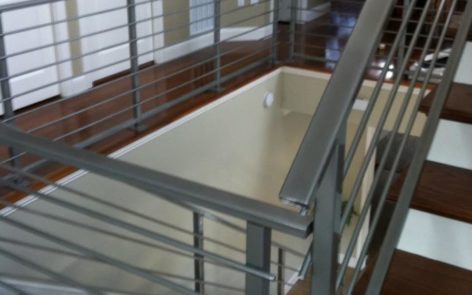
Cable Railing
With a commute of “only four stop signs” when he goes into the office every day, Richardson considers himself lucky to live and work in Jacksonville Beach. Other than having to deal with the federal requirements required for running his business, he says he’s glad he found a career he enjoys.
“I’m very fortunate because I love doing what I do,” he said. “The only portion I hate are the requirements put on the business by the federal government. I don’t like doing the paperwork, audits about the work I’ve done and what I project to do next year. But, other than that, I just love this business and I plan to keep doing it for a while.”
For more information, visit classicirondecor.com or call 904-241-5022.
-###-
This article was originally published in the Times Union of Jacksonville July 22, 2016

